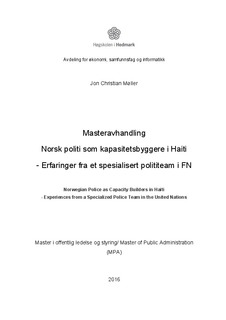Norsk politi som kapasitetsbyggere i Haiti - Erfaringer fra et spesialisert polititeam i FN
Master thesis
Permanent lenke
http://hdl.handle.net/11250/2427406Utgivelsesdato
2016Metadata
Vis full innførselSamlinger
Sammendrag
Sammendrag: Norsk politi har siden 2010 deltatt i FN-styrken MINUSTAH i Haiti med bekjempelse av seksualforbrytelser som hovedoppgave. Bidraget er utført som et prosjekt hvor et spesialisert polititeam ble tildelt eget budsjett av Utenriksdepartementet for å gjennomføre arbeidsoppgavene. Prosjektperioden gikk fra 2010 til 2014 da det ble avløst av et nytt prosjekt som viderefører arbeidet til et høyere faglig nivå i Haitian National Police. Prosjektmålet har vært kapasitetsbygging ved økt operasjonell evne til å jobbe med seksualforbrytelser gjennom bedret kunnskap og infrastruktur. Sistnevnte som bygging av egne kontorbygg for politiet øremerket arbeid med seksuelle overgrep. Etablereringen av et spesialisert polititeam med selvstendig budsjett var i 2010 helt nytt i FN. Pr. 2016 er Norge fortsatt eneste medlemsstat i FN som har benyttet seg av konseptet. Noen land har forsøkt seg på tilsvarende i andre feltmisjoner, men ikke identisk som det norske konseptet. Teamet har i mange ulike internasjonale fora blitt trukket frem som en suksess i FNs kapasitetsbygging. FN har selv kalt det for ”the future of UN policing”1. Jeg har sett nærmere på arbeidet det norske teamet har utført i Haiti i perioden 2010-2014 og hvordan det har vært mottatt i FN og i vertslandet. Videre har jeg analysert resultatene av prosjektet og vurdert disse opp mot måloppnåelse og bærekraftighet. Prosjektets kvantitative resultater viser at 1191 haitiske politifolk er trent innen SGBV og 15 ulike kontorer er åpnet i løpet av prosjektperioden. Mer utfordrende er det å måle effekt av kapasitetsbygging og utviklingsprosjekter. Kvalitative resultater er ikke like enkle å måle som rent tallmateriale. Gjennom empirisk metodikk har jeg systematisert og analysert både kvalitative og kvantitative måleenheter for å komme frem til om det norske SGBV-prosjektet har gitt haitisk politi en økt kapasitet i bekjempelse av seksualforbrytelser som i er bærekraftig etter endt prosjektperiode. Undersøkelsene mine viser at prosjektet langt på vei har nådd både sine kvantitative og kvalitative mål. Dette til tross for interne motkrefter og problematiserende prosedyrer i MINUSTAH. Resultatene understreker betydningen av nytenkning når FN skal gjennomføre kapasitetsbygging i svake stater, men også viser også et behov for økt institusjonell fleksibilitet og endringsvilje i nevnte organisasjon. Engelsk sammendrag (abstract): Norwegian Police as Capacity Builders in Haiti – Specialized Police Team in the UN The Norwegian police have participated in the United Nations mission MINUSTAH in Haiti since 2010 aiming capacity building within the Haitian National Police’s (HNP) ability to combat sexual crimes. The work was organized as a project where a specialized police team was given its own budget from the Ministry of Foreign Affairs. The project period was from 2010 to 2014 when it was replaced by a new project aiming a higher level in HNP. The Project contents has focused on education of Police Officers and construction of offices for the Haitian Police earmarked work with SGBV. In 2010, the establishment of a specialized police team with an independent budget was something completely new in the UN. In 2016, Norway still remains the only member state which has availed itself of this concept. Some countries have implemented similar concepts in other field missions, but not identical to the Norwegian concept. The Norwegian SPT has in international forums been highlighted as a success in the UN police capacity building. The UN itself has even called it the "the future of UN policing"2. I have in this thesis described the work by the Norwegian funded SGBV team in Haiti in the period from 2010-2014, and how it has been received by the United Nations and the host country. In addition, I evaluated the results of the project and considered these to the achievement and sustainability. Project quantitative results show that 1191 Haitian police officers are trained in SGBV and 15 different offices are inaugurated through the project period. It is more challenging to measure the effectiveness of capacity building and development. The qualitative results are not as easy to measure as quantitative. In this thesis, I have through empirical methodology systematized and analyzed both qualitative and quantitative measurements and found that the Norwegian project has provided Haitian police with increased and sustainable capacity in combating sexual crimes. The thesis shows that the project has achieved both its quantitative and qualitative goals despite internal counterforces and challenging procedures in MINUSTAH. The results underline the importance of innovation if the UN wants to do capacity building in fragile states. It also shows the need for more institutional flexibility and adaptability in the organization.
Beskrivelse
Erfaringsbasert master, 90 studiepoeng.
